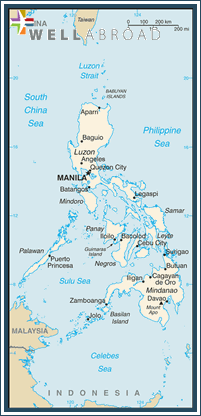|
MOST RECENT ALERTS
There's no recent alert.
|

|
|||||||||||||||
| COUNTRY OVERVIEW | ||||||||||||||||
|---|---|---|---|---|---|---|---|---|---|---|---|---|---|---|---|---|
|
| COUNTRY GENERAL INFORMATION | |||||||
|---|---|---|---|---|---|---|---|
| Language: |
Filipino (based on Tagalog), English |
||||||
| Currency: | Philippine peso (PHP) | ||||||
| Predominant Religions: |
Roman Catholic |
||||||
| National Holidays: | Independence Day, 12 June (1898) | ||||||
| Economic Status: |
The Philippines is a developing nation with a democratic system of government, located in Southeast Asia. |
||||||
| Security: |
Armed Forces of the Philippines (AFP), Army, Navy (includes Coast Guard and Marine Corps), Air Force |
||||||
| US Presence: | |||||||
| Document Requirements: |
U.S. citizens may enter the Philippines without a visa upon presentation of their U.S. passport, valid for at least six months after the date of entry into the Philippines, and a return ticket to the United States or an onward ticket to another country. Upon arrival, immigration authorities will annotate the traveler’s passport with an entry visa valid for 21 days. If the traveler plans to stay longer than 21 days, he/she must apply for an extension at the Philippine Bureau of Immigration and Deportation's main office at Magallanes Drive; Intramuros, Manila, Philippines or at any of its provincial offices. Persons who overstay their visas are subject to fines and detention by Philippine immigration authorities. American citizens are urged to remain aware of their visa status while in the Philippines and to strictly follow immigration laws and regulations. Travelers departing the country from international airports must pay a Passenger Service Charge in Philippine Pesos. Visit the Embassy of the Philippines web site for the most current visa information. Special requirements exist for the entry of unaccompanied minors. In an effort to prevent international child abduction, the Philippine Government requires that a waiver of exclusion be obtained from a Philippine Embassy or Consulate or from the Bureau of Immigration and Detention in Manila for a child under 15 years of age who plans to enter the Philippines unaccompanied by either a parent or legal guardian prior to the child's entry into the Philippines. Information about dual nationality or the prevention of international child abduction can be found on our web site. For further information about customs regulations, please read our Customs Information sheet. |
||||||
| Major Airports: |
Airports: 253, Airports w/paved runways: 82 |
||||||
| Servicing Airlines: |
|
||||||
| Risks and Precautions: |
US Dept. of State Travel Warning for PHILIPPINES updated 27 January 2009. |
||||||
| Mortality Statistics: |
Infant MR total: 24.24 deaths/1,000 live births |
||||||
| Immunization Indicators: |
Required: None Recommended: Hep A & B, Typhoid, Rabies, Japanese Encephalitis, Polio, Boosters: MMR, DPT, as needed. |
||||||
| Infectious Disease Concerns: |
Malaria risk area in Philippines: Risk exists in areas below 600 m (<1,969 ft), except no risk in Bohol Island, Borocay Island, Catanduanes Island, and Cebu Island. No risk is considered to exist in Manila or other urban areas. |
||||||
| Overall Quality of Medical Services: |
Adequate medical care is available in major cities in the Philippines, but even the best hospitals may not meet the standards of medical care, sanitation, and facilities provided by hospitals in the US. Medical care is limited in rural and more remote areas. |
||||||
| Providers in Network: |
|
||||||
| Recent Medical Threats/ Concerns/Warnings: |
Dengue, chikungunya, filariasis, Japanese encephalitis, and plague are diseases carried by insects that also occur in this region.
|
||||||
| Communications Info: |
Country Code: +63 |
||||||






